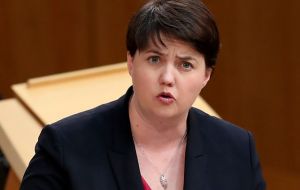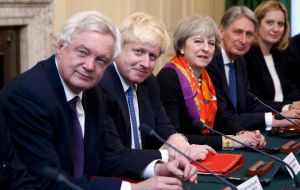MercoPress. South Atlantic News Agency
Theresa May stays on but with a shaky coalition: Ulster Unionists and Scottish Tories
 Initial talks have begun with Northern Ireland's DUP after Mrs. May failed to secure a majority. Tories needed 326 seats to win but fell eight short. DUP won 10.
Initial talks have begun with Northern Ireland's DUP after Mrs. May failed to secure a majority. Tories needed 326 seats to win but fell eight short. DUP won 10.  Labour has urged Mrs. May to “make way” for it to form a government and she also faces criticism over the DUP deal.
Labour has urged Mrs. May to “make way” for it to form a government and she also faces criticism over the DUP deal.  The leader of the Scottish Conservatives, Ruth Davidson, tweeted a link to a speech she had made about same-sex marriage - something the DUP opposes.
The leader of the Scottish Conservatives, Ruth Davidson, tweeted a link to a speech she had made about same-sex marriage - something the DUP opposes.  The leader of the Scottish Conservatives, Ruth Davidson, tweeted a link to a speech she had made about same-sex marriage - something the DUP opposes.
The leader of the Scottish Conservatives, Ruth Davidson, tweeted a link to a speech she had made about same-sex marriage - something the DUP opposes. Theresa May is expected to finalize her team of ministers later as she seeks to form a government with the support of the Democratic Unionist Party. Ministers say initial talks have begun with Northern Ireland's DUP after the Conservatives failed to secure a majority in Thursday's election. The Tories needed 326 seats to win but fell short by eight. The DUP won 10.
Labour has urged Mrs. May to “make way” for it to form a government and she also faces criticism over the DUP deal. The leader of the Scottish Conservatives, Ruth Davidson, tweeted a link to a speech she had made about same-sex marriage - something the DUP opposes.
A number of high-profile government figures have already confirmed they are keeping their jobs in the wake of an election that saw the Tories lose 13 seats.
Philip Hammond will stay as Chancellor, Boris Johnson will remain as Foreign Secretary and Amber Rudd - narrowly re-elected as an MP after a recount - will continue as Home Secretary. David Davis will also stay on as Brexit Secretary and Sir Michael Fallon will keep his role as Defense Secretary.
But eight ministers lost their seats at the general election and will need to be replaced.
Mrs. May announced her intention to work with the DUP to form a government on Friday, just hours after an election that has left the UK with a hung parliament for the second time in seven years.
Speaking on the steps of No 10 after an audience with the Queen, the prime minister said the parties had a “strong relationship” and that she intended to form a government which could “provide certainty and lead Britain forward at this critical time for our country”.
DUP leader Arlene Foster confirmed that she had spoken to Mrs. May and that they would speak further to “explore how it may be possible to bring stability to this nation at this time of great challenge”.
Money for Northern Ireland will undoubtedly be part of their demands, and Mrs May will expect that. But trickier will be any demands they have about the implementation of Brexit in Northern Ireland - in particular the DUP's determination to maintain a soft border with the south. Another potential problem is the planned restart of negotiations for power-sharing in the province.
Typically the British government tries to act as an honest broker between Republicans and Unionists. But if Mrs May is doing a deal with the DUP, that could make it harder to reach an agreement with Sinn Fein.
Mrs May's decision to seek a deal with the DUP has prompted concerns from some Tories. Northern Ireland is the only part of the UK where same-sex marriage is not legal.
Ruth Davidson, who is gay, plans to marry her partner in the near future and said she had been straightforward with Mrs. May about her concerns. By winning 12 additional seats in Scotland, Ruth Davidson played a significant part in helping Theresa May to stay in Downing Street.
Ms Davidson clearly plans to use her new-found influence to try to affect the Brexit negotiations as well, suggesting that she believes the UK should try to remain in the EU single market. Other members of the party have criticized Mrs. May for staying on in Downing Street after failing to secure a majority government.
Former Business Minister Anna Soubry called for her to “consider her position” after a “disastrous” election campaign.
Labour has also demanded her resignation, with its leader Jeremy Corbyn saying Mrs. May should “make way” for a government that would be “truly representative of the people of this country”. The party won 262 seats in the election - up by 30 from 2015.
With 40% of the vote, it also secured its biggest vote share since the 2001 election when Tony Blair won his second term as PM. Mr. Corbyn said his party was ready to form a minority government of its own, but stressed he would not enter into any “pacts or deals” with other parties.




Top Comments
Disclaimer & comment rules-

-

-

Read all comments@DTree
Jun 13th, 2017 - 08:55 am +3You say that “like everyone else - severely underestimated Corbyn”
Not everyone underestimated him.
Back in 2015 when he won the leadership of the Labour party, I posted this:
“
Iraq war: he opposed it from the start. With hindsight, much of the electorate might appreciate that.
IRA: he proposed dialogue from the start. In retrospect this is what happened in the end.
Expense scandal: No fraudulent claims submitted. You have to respect that.
EU: He is happy to leave - that is a big one for the UK electorate isn't it?
University fees: how many graduates here had to pay for their university degrees? This might resonate with many.
He seems to be an honest man with integrity. Is that his biggest problem?
”
http://en.mercopress.com/2015/09/15/jeremy-corbyn-and-the-falkland-islands/comments#comment414229
As an outsider his appeal to the electorate seemed obvious to me.
Considering he fought the campaign against the headwinds of hostile mainstream press and the continual sabotage from his own parliamentarians, his gains are impressive. [In modern times has any electoral campaign been successful without the backing of the Sun?]
...
Regardless of where you stand on the politics, it is always good for democracy when the young become more engaged.
Hepatitis, you keep repeating nonsense about 25 years ad infinitum which doesn't make sense. Are you blind too?
Jun 11th, 2017 - 03:24 am +2Because we get tired of putting down serial idiots like you it's boring... and we have a need to focus on something interesting and important.
Shaky deals to keep a worn-out May in power, while the media keeps ignoring Corbyn and his electors, a rising force and a hope for the future.
Jun 10th, 2017 - 11:10 am +1Commenting for this story is now closed.
If you have a Facebook account, become a fan and comment on our Facebook Page!